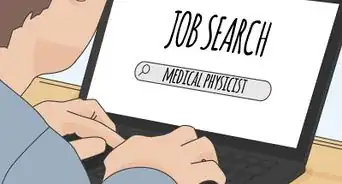This article was co-authored by wikiHow Staff. Our trained team of editors and researchers validate articles for accuracy and comprehensiveness. wikiHow's Content Management Team carefully monitors the work from our editorial staff to ensure that each article is backed by trusted research and meets our high quality standards.
There are 9 references cited in this article, which can be found at the bottom of the page.
This article has been viewed 68,589 times.
Learn more...
Working as a pharmacy technician can be a challenging and rewarding career. However, in order to become a pharmacy technician you will likely need to become certified and licensed, as many states require you to do so. These exact requirements will vary from state to state. The certification itself is handled by one organization, the Pharmacy Technician Certification Board. After successfully applying and passing the exam, you may become certified, which will allow you to pursue your licensing.
Steps
Qualifying For Your Certification
-
1Meet the qualifications. Before you apply for certification with the PTCB you will need to make sure you meet the basic qualifications. These will ensure that you will be able to progress through the process without trouble or losing your application fee. Take a moment to review the following qualifications[1]
- High school diploma or equivalent.
- You will have to report any criminal records.
- Compliance with PTCB policies. These include obeying pharmacy laws, providing accurate information, not disclosing details of examination processes, provide ethical and legal service to customers.[2]
- Obtain a passing score on the Pharmacy Technician Certification Exam (PTCE). The passing score is 1400 on the current scaled scoring system.
-
2Be aware of disqualifications. Even though you may meet the qualifications required by the PTCB, there are a few instances where you may be disqualified. Knowing what these disqualifying factors are can help you determine if you are able to proceed in your application process.[3]
- Existing criminal records will disqualify you. Felony charges or violations related to drug, substance, or pharmacy policy.
- Violation of PTCB policy will also disqualify you. These include violation of any local or federal laws and violations of pharmacy or drug related policies and practices.
- For more information about the PTCB's code of conduct, visit this page.
Advertisement -
3Report any changes immediately. If you have had some event in your life that would disqualify you from receiving certification from the PTCB, you are required to inform the board immediately. Part of the application process involves your commitment to being honest and up-to-date with any issues regarding your qualifications.[4]
Applying For Your Exam
-
1Apply on-line. Applying for your certification exam is a simple process that can be done on-line. As long as you have access to the Internet you will be able to start your application process and take the exam later on. If you are ready to apply for the exam, visit the PTCB's website to begin.[5]
- You can apply at this page.
-
2Be ready for the cost of the application. Applying for the certification test is not free. When you apply you will be required to pay the cost of the exam before you are able to continue. Being aware of the cost will help you plan your finances, pay the fee, and continue through the process.[6]
- The application fee will be $129.00
- Canceling or rescheduling your exam will be free as long as it is done 24 hours before the test.[7]
- Misrepresenting your qualifications might result in penalties like losing your license or even criminal charges, so be sure all your information is accurate.
-
3Schedule your exam appointment. Once you have successfully applied and paid your fees, your application will be reviewed. If the PTCB finds your application to be in good standing you will be allowed to scheduled your exam date. Accepting an exam date will officially register you for the examination.[8]
- Schedule on-line here
- You can also call Pearson VUE at (866) 902-0593 to schedule.
Taking The Exam
-
1Try the practice test. Before you take the actual exam you may want to take the practice test. The practice test will allow you to gain an understanding of what material is on the test and what you may need to study for. Taking a practice test can help you get familiar with the test, so you're more likely to do well.[9]
- The practice exam has the same amount of questions as the actual exam.
- The practice exam costs $29.00.
- You will need access to a computer and the Internet.
-
2Understand the format. Knowing what to expect when it comes to the exam's format can help you prepare your possible answers. Take a few moments to review the basic format of the certification exam:[10]
- The test is two hours long. However, you will have only 1 hour and 50 minutes to complete the test.
- There are 90 multiple choice questions.
- Only 80 questions will be scored.
-
3Learn which areas of knowledge the test focuses on. Beyond learning the format of the test, knowing what specific areas of knowledge the test will cover can help you better prepare. Studying these areas will also help you do well on your test and successfully complete your certification. Take a look at some of the areas the test will cover:[11]
- Pharmacy Information Systems Usage and Application
- Medication Order Entry and Fill Process
- Pharmacy Inventory Management
- Medication Safety
- Pharmacy Quality Assurance
- Pharmacy Billing and Reimbursement
- Pharmacology for Technicians
- Pharmacy Law and Regulations
- Sterile and Non-sterile Compounding
Applying For Your License
-
1Know that each state will have it's own requirements. Currently, there is no standardized requirements, tests, or processes between the states. You won't be able to assume your state has anything in common with another when it comes to getting licensed. However, you can assume that you will need to have your PTCB certification.[12]
-
2Learn some of the basic requirements. Despite there being no certain shared requirements for licensing between states, there are some common elements. Knowing these commonalities can help you know what you might expect from your own state's requirements. Take a moment to review some of the common requirements of licensing between states.[13]
- General requirements such as being a certain age, meeting certification standards, and receiving appropriate education can be expected.[14]
- Fees for applying and receiving your license should be expected.[15]
- You may need to attach your PTCB certificate or other educational proof.[16]
- There will be a waiting period while your application is processed.[17]
-
3Contact your local licensing organizations and apply. In order to finalize your licensing process and learn the details about your state's requirements, you will need to contact your local licensing organizations. These organizations will be able to properly direct you and help you obtain your license, allowing you to start your career as a pharmacy technician.[18]
- These organizations will be state run agencies and each state will have their own office that licenses professionals.
- Many states have their process and licensing forms available on line. For some examples, check out this link.
- You can find a list of states and their requirements here at this page.
References
- ↑ https://www.ptcb.org/get-certified/apply
- ↑ https://www.ptcb.org/resources/code-of-conduct#.Vs2-zUIoDtQ
- ↑ https://www.ptcb.org/get-certified/apply
- ↑ https://www.ptcb.org/get-certified/apply
- ↑ https://www.ptcb.org/get-certified/apply
- ↑ https://www.ptcb.org/get-certified/apply
- ↑ https://www.ptcb.org/get-certified/schedule#.Vrvd3EKKaBt
- ↑ https://www.ptcb.org/get-certified/apply
- ↑ https://www.ptcb.org/get-certified/prepare/practice-exam#.VrvPkUIoDtQ
- ↑ https://www.ptcb.org/get-certified/prepare#.VrvPakIoDtQ
- ↑ https://www.ptcb.org/get-certified/prepare#.VrvPakIoDtQ
- ↑ https://www.pennfoster.edu/programs/healthcare/pharmacy-technician-career-diploma
- ↑ https://www.pennfoster.edu/admissions/admissions-requirements/state-licensing
- ↑ http://www.op.nysed.gov/prof/pharm/pharmlic.htm
- ↑ http://www.pharmacy.ca.gov/forms/tch_app_pkt.pdf
- ↑ http://www.pharmacy.ca.gov/forms/tch_app_pkt.pdf
- ↑ http://www.pharmacy.ca.gov/forms/tch_app_pkt.pdf
- ↑ https://www.pennfoster.edu/programs/healthcare/pharmacy-technician-career-diploma










































































Medical Disclaimer
The content of this article is not intended to be a substitute for professional medical advice, examination, diagnosis, or treatment. You should always contact your doctor or other qualified healthcare professional before starting, changing, or stopping any kind of health treatment.
Read More...